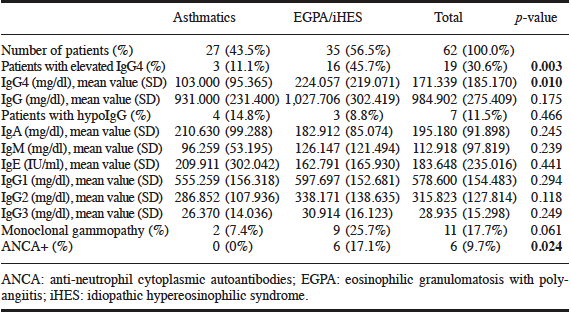
Piga MA, Martini M, Fraticelli P, Garritani MS, Ghirelli G, Canalini A, Antonicelli L, Martino GP, Gallifuoco M, Di Vincenzo A, Braschi MC, Danieli MG, Bilò MB, Moroncini G. Clin Exp Rheumatol. 2025 Apr;43(4):710-717. doi: 10.55563/clinexprheumatol/3ihc3t.
Abstract
OBJECTIVES:
Eosinophilic granulomatosis with polyangiitis (EGPA) and idiopathic hypereosinophilic syndrome (iHES) are systemic hypereosinophilic diseases largely overlapping. Type 2 (T2)-eosinophilic asthma is documented in 100% and 44-95% of EGPA and iHES patients, respectively, probably representing the beginning of the systemic eosinophilic disorders, as suggested by mepolizumab, effective in both asthma and EGPA/iHES. In this respect, there are no predictive biomarkers of progression from T2-eosinophilic asthma into EGPA/iHES. Immunoglobulins G type 4 (IgG4) take part in T2-eosinophilic inflammation, and elevated serum IgG4 have been previously documented in asthma, EGPA and HES. The objective of this study was to compare serum IgG4 between T2-eosinophilic asthma and EGPA/iHES in order to identify significant differences that could represent a reasonable background for prospective studies on IgG4 as potential predictive biomarker of progression from asthma to EGPA/iHES.
METHODS:
In this retrospective/cross-sectional case-control study, patients affected by T2-eosinophilic asthma or EGPA/iHES were consecutively enrolled. All patients underwent blood tests for serum IgG4. Asthmatics and EGPA/iHES patients were stratified upon serum IgG4 values (normal or elevated).

Results of study blood tests, asthmatics vs. EGPA/iHES patients
RESULTS:
62 patients were enrolled (27 asthmatics, 35 EGPA/iHES). The frequency of patients with elevated serum IgG4 was higher in the EGPA/iHES group than in the asthmatics (45.7% vs. 11.1%, p=0.003), as well as the mean serum IgG4 value (p=0.010).
CONCLUSIONS:
Elevated serum IgG4 seemed to discriminate between T2-eosinophilic asthma “alone” and T2-eosinophilic asthma evolved into EGPA/iHES. This finding could represent a reasonable background for prospective long-term studies on asthmatic naive patients aimed at investigating IgG4 as a potential predictive biomarker of progression from asthma to EGPA/iHES.
